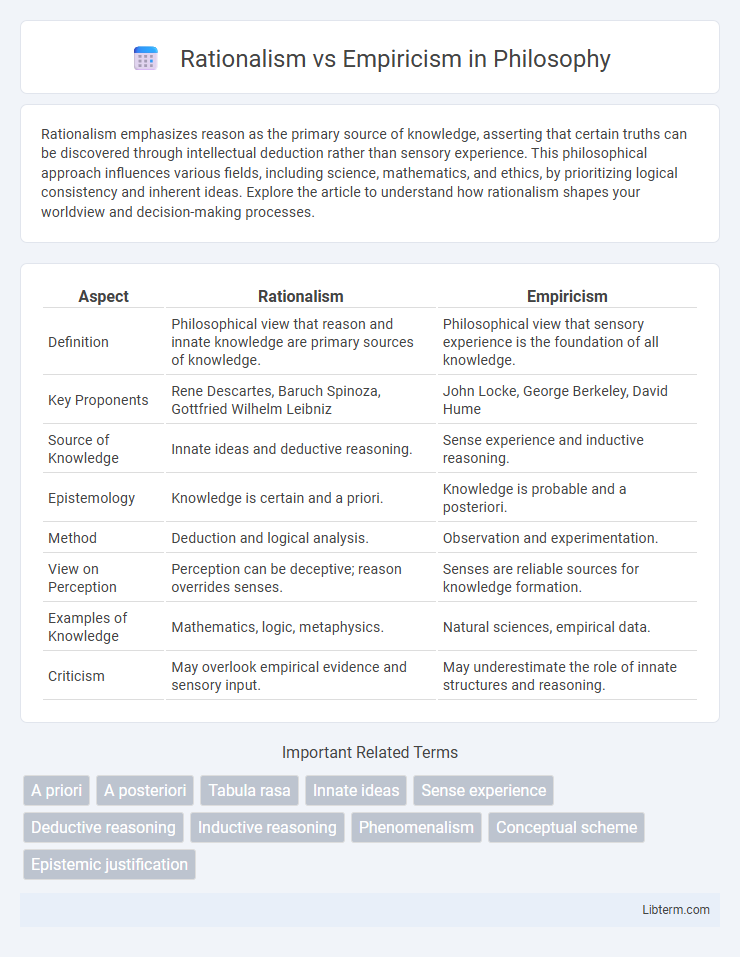Rationalism emphasizes reason as the primary source of knowledge, asserting that certain truths can be discovered through intellectual deduction rather than sensory experience. This philosophical approach influences various fields, including science, mathematics, and ethics, by prioritizing logical consistency and inherent ideas. Explore the article to understand how rationalism shapes your worldview and decision-making processes.
Table of Comparison
| Aspect | Rationalism | Empiricism |
|---|---|---|
| Definition | Philosophical view that reason and innate knowledge are primary sources of knowledge. | Philosophical view that sensory experience is the foundation of all knowledge. |
| Key Proponents | Rene Descartes, Baruch Spinoza, Gottfried Wilhelm Leibniz | John Locke, George Berkeley, David Hume |
| Source of Knowledge | Innate ideas and deductive reasoning. | Sense experience and inductive reasoning. |
| Epistemology | Knowledge is certain and a priori. | Knowledge is probable and a posteriori. |
| Method | Deduction and logical analysis. | Observation and experimentation. |
| View on Perception | Perception can be deceptive; reason overrides senses. | Senses are reliable sources for knowledge formation. |
| Examples of Knowledge | Mathematics, logic, metaphysics. | Natural sciences, empirical data. |
| Criticism | May overlook empirical evidence and sensory input. | May underestimate the role of innate structures and reasoning. |
Introduction to Rationalism and Empiricism
Rationalism asserts that knowledge primarily arises from reason and innate ideas, emphasizing the role of intellectual deduction over sensory experience. Empiricism, in contrast, holds that knowledge is derived from sensory observations and empirical evidence, rejecting the notion of innate ideas. Understanding this foundational debate illuminates the contrasting ways philosophers approach the origin, scope, and validation of human knowledge.
Defining Rationalism: Key Principles
Rationalism asserts that knowledge primarily originates from reason and innate ideas rather than sensory experience, emphasizing the mind's capacity to grasp truths independently of empirical evidence. Central principles include the belief in a priori knowledge, the use of deductive reasoning, and the existence of innate concepts or ideas present in the human intellect. Prominent rationalist philosophers such as Descartes, Spinoza, and Leibniz champion the view that logical analysis and intellectual intuition constitute the foundation of genuine understanding.
Understanding Empiricism: Main Tenets
Empiricism asserts that knowledge originates primarily from sensory experience, emphasizing observation and experimentation as the foundations of learning. Key tenets include the rejection of innate ideas, the belief that the mind begins as a tabula rasa, and the understanding that all concepts derive from sensory input. Empiricists like John Locke and David Hume advocate for empirical evidence as the basis for scientific inquiry and knowledge acquisition.
Historical Development of Rationalism
Rationalism, which emphasizes reason as the primary source of knowledge, traces its roots to ancient Greek philosophers such as Plato and Descartes in the 17th century who argued that innate ideas and deductive reasoning lead to certain knowledge. Throughout the Enlightenment, rationalism evolved with thinkers like Spinoza and Leibniz advancing the belief in a priori knowledge independent of sensory experience. This philosophical stance developed as a critical response to empiricism, which prioritizes sensory experience, laying the groundwork for modern epistemology and the debate over the origins of human knowledge.
The Evolution of Empiricism
The evolution of empiricism traces back to the early modern period, with philosophers like John Locke and David Hume emphasizing experience as the foundation of knowledge. Empiricism asserts that sensory data and observation are crucial in forming concepts and validating truths, contrasting sharply with rationalism's reliance on innate ideas and deduction. Advances in scientific methodology and experimental techniques throughout the 17th and 18th centuries further solidified empiricism's role in epistemology and the development of modern science.
Major Philosophers: Rationalists vs Empiricists
Rene Descartes, Baruch Spinoza, and Gottfried Wilhelm Leibniz epitomize major rationalist philosophers who argue that knowledge primarily derives from reason and innate ideas rather than sensory experience. In contrast, empiricists such as John Locke, George Berkeley, and David Hume emphasize the importance of sensory experience and observation as the foundation of all knowledge, rejecting the existence of innate ideas. These opposing philosophical frameworks shaped early modern epistemology, influencing subsequent debates on the sources and limits of human understanding.
Core Differences Between Rationalism and Empiricism
Rationalism emphasizes knowledge acquisition through reason and innate ideas, asserting that certain concepts exist independently of sensory experience. Empiricism, in contrast, argues that all knowledge derives from sensory experience and observation, rejecting innate ideas as a foundation for understanding. The core difference lies in rationalism's reliance on intellectual deduction versus empiricism's dependence on empirical evidence and experimentation.
Impact on Modern Epistemology
Rationalism, emphasizing innate ideas and reason as the primary source of knowledge, and empiricism, stressing sensory experience and observation, have profoundly shaped modern epistemology by framing debates on the origins and limits of human understanding. This dialectic has influenced contemporary theories such as foundationalism and coherentism, as well as the development of scientific methodology, balancing a priori reasoning with empirical evidence. Seminal figures like Descartes and Locke laid the groundwork for ongoing discussions about justification, knowledge acquisition, and the reliability of human cognition in philosophy and cognitive science.
Applications in Science and Philosophy
Rationalism emphasizes knowledge derived from reason and innate ideas, playing a crucial role in theoretical sciences such as mathematics and logic, where foundational principles are deduced independently of sensory experience. Empiricism, grounded in observation and experimentation, underpins the empirical methodologies of natural sciences like physics, chemistry, and biology, relying on sensory data to formulate and test hypotheses. In philosophy, rationalism informs epistemological debates about certainty and a priori knowledge, while empiricism contributes to discussions on knowledge acquisition and the limits of human understanding through sensory experience.
Conclusion: Bridging Rationalism and Empiricism
Bridging Rationalism and Empiricism involves integrating innate ideas with sensory experience to form a comprehensive understanding of knowledge acquisition. Philosophers increasingly recognize that reason and empirical evidence complement each other in constructing reliable beliefs and scientific theories. This synthesis supports a balanced epistemology that leverages both a priori reasoning and a posteriori validation.
Rationalism Infographic

 libterm.com
libterm.com